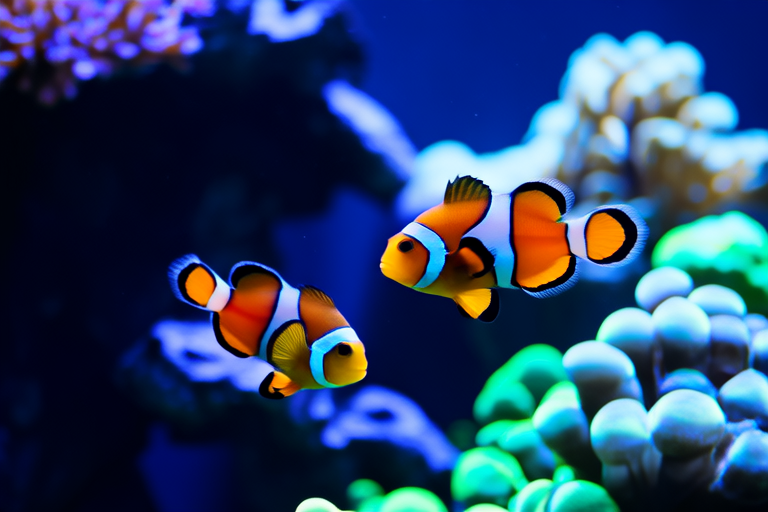Clownfish Companions: Why These Vibrant Fish Are Perfect for Marine Aquariums
Introduction:
Welcome to the vibrant world of marine aquariums! Among the most popular and beloved inhabitants of these underwater gardens are clownfish. Known for their striking colors and playful personalities, clownfish have captivated aquarium enthusiasts for decades. This article delves into the diverse species of clownfish, their compatibility with anemones and other tank mates, the ideal habitat setup, dietary needs, and the many benefits they bring to your aquarium.
Diversity and Vibrancy of Clownfish Species
There are approximately 30 recognized species of clownfish, each showcasing a unique array of colors and patterns. The most well-known species is the orange-and-white-striped Amphiprion percula, commonly known as the false clownfish or clown anemonefish. Other popular species include the maroon clownfish (A. melanopus) with its deep red hue, the percula clownfish (A. percula) with its iconic orange and white stripes, and the skunk clownfish (A. akallopisos) which features a broad white stripe along its body. Each species has its own distinct characteristics and behaviors, making them all appealing choices for marine aquariums.
Compatibility with Anemones and Tank Mates
One of the most fascinating aspects of clownfish is their symbiotic relationship with sea anemones. In the wild, clownfish live among the tentacles of anemones, which provide protection from predators. While it is not always necessary to house clownfish with anemones in an aquarium, many hobbyists choose to do so for aesthetic reasons. When selecting anemones for your tank, ensure they are compatible with the specific clownfish species you have. Popular anemone choices for clownfish include the bubble tip anemone (Entacmaea quadricolor) and the carpet anemone (Stichodactyla mertensii).
Clownfish are generally peaceful fish, making them excellent companions for a variety of other marine species. They coexist well with small, non-aggressive fish like damselfish, blennies, and gobies. However, it is important to avoid housing them with larger, more aggressive fish that may pose a threat. Additionally, it is crucial to introduce new tank mates gradually to prevent stress and aggression. Clownfish establish a clear pecking order within their group, so it is recommended to introduce only one pair of clownfish to the tank initially.
Setting Up an Appropriate Habitat
Creating a suitable environment for clownfish involves several key factors. First, consider the size of your tank. A minimum of 30 gallons is recommended for a single pair of clownfish, while larger tanks can accommodate additional species or tank mates. Ensure that the tank has adequate filtration and water circulation to maintain water quality and oxygen levels. Clownfish thrive in stable water conditions, so invest in a reliable heater and thermometer to maintain a consistent temperature between 76°F and 82°F (24°C and 28°C).
Proper lighting is essential for both the health of the clownfish and any anemones in the tank. Use full-spectrum LED lights that mimic natural sunlight and provide at least 8-10 hours of light per day. Incorporate plenty of live rock and coral structures to create hiding spots and stimulate natural behavior. Live rock also provides beneficial bacteria that help break down waste and maintain water quality.
Water Conditions and Diet Requirements
Maintaining optimal water conditions is crucial for the health of your clownfish. Regular water changes of about 10-20% every two weeks are recommended to remove toxins and replenish essential minerals. Test your water regularly for parameters such as pH, ammonia, nitrite, and nitrate levels. Aim for a pH range of 8.1 to 8.4 and keep ammonia and nitrite levels at zero. Nitrate levels should be kept below 20 ppm.
Clownfish are omnivorous and require a balanced diet to thrive. In the wild, they feed on zooplankton, algae, and small crustaceans. In captivity, they can be fed a variety of foods including high-quality flake food, pellets, frozen brine shrimp, and mysis shrimp. It is important to offer a varied diet to ensure proper nutrition. Feed your clownfish twice daily, providing only what they can consume within a few minutes to prevent overfeeding.
Behavioral Traits and Fascinating Observations
Clownfish exhibit several interesting behaviors that make them a joy to watch. One of their most notable traits is their boldness. Unlike many other marine fish, clownfish are not easily frightened by human presence and will often swim close to the glass for observation. This makes them perfect candidates for beginners who want to enjoy the beauty of marine life without the stress of shy or skittish fish.
Each clownfish has its own unique personality, which can be observed through their interactions with other tank mates and their environment. Some individuals are more adventurous, exploring new areas of the tank, while others prefer to stay close to their anemone or favorite hiding spot. Watching these behaviors unfold can be both entertaining and educational, offering insights into the social dynamics and survival strategies of marine creatures.
Benefits of Keeping Clownfish
Adding clownfish to your marine aquarium offers numerous benefits beyond just their captivating appearance. Their vibrant colors enhance the overall aesthetic appeal of the tank, creating a visually stunning display that can brighten any room. For aquarists, keeping clownfish also provides valuable educational opportunities. By observing their behavior and learning about their care requirements, hobbyists gain a deeper understanding of marine ecosystems and the importance of maintaining healthy aquatic environments.
Moreover, clownfish are relatively hardy compared to some other marine fish, making them a great choice for both novice and experienced aquarium enthusiasts. Their resilience, combined with their peaceful nature and ease of care, ensures that they remain a popular choice among hobbyists worldwide.
In conclusion, clownfish are truly remarkable creatures that bring color, charm, and educational value to any marine aquarium. With their diverse species, peaceful nature, and fascinating behaviors, they make perfect companions for both beginners and seasoned aquarists. By providing them with the right habitat, water conditions, and diet, you can ensure that your clownfish thrive and continue to delight you for years to come.
